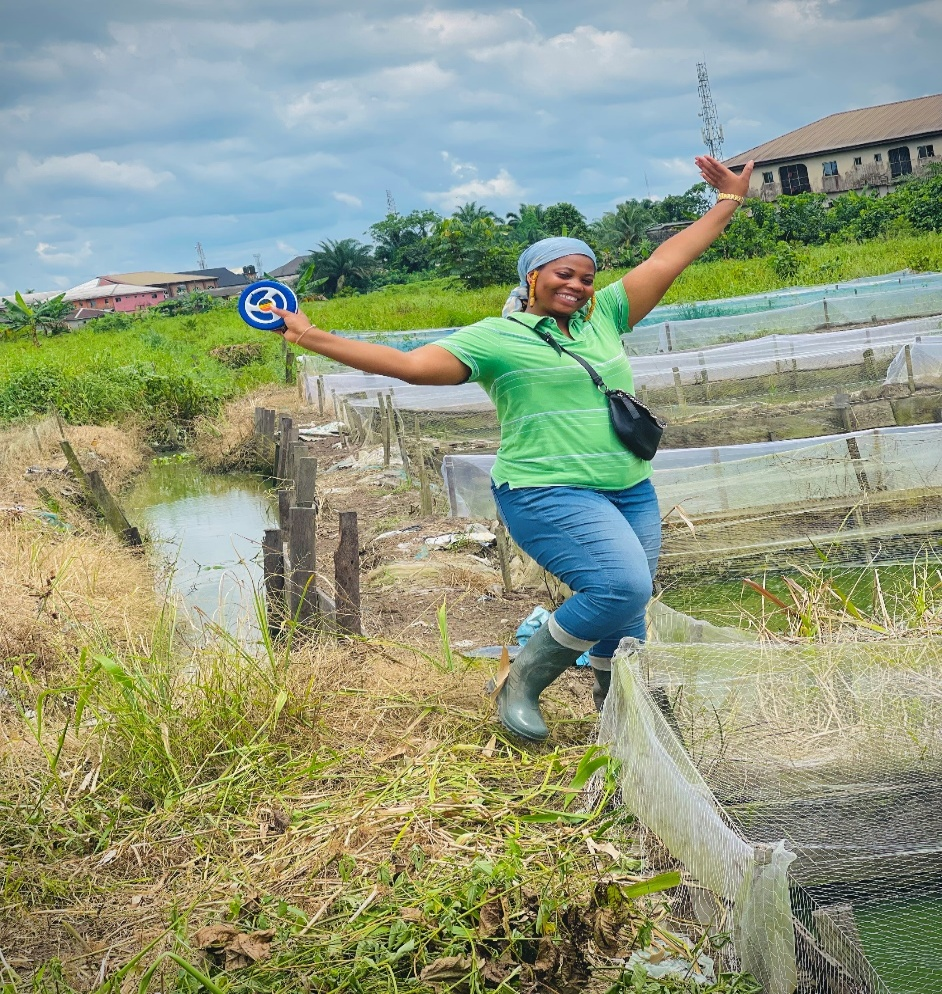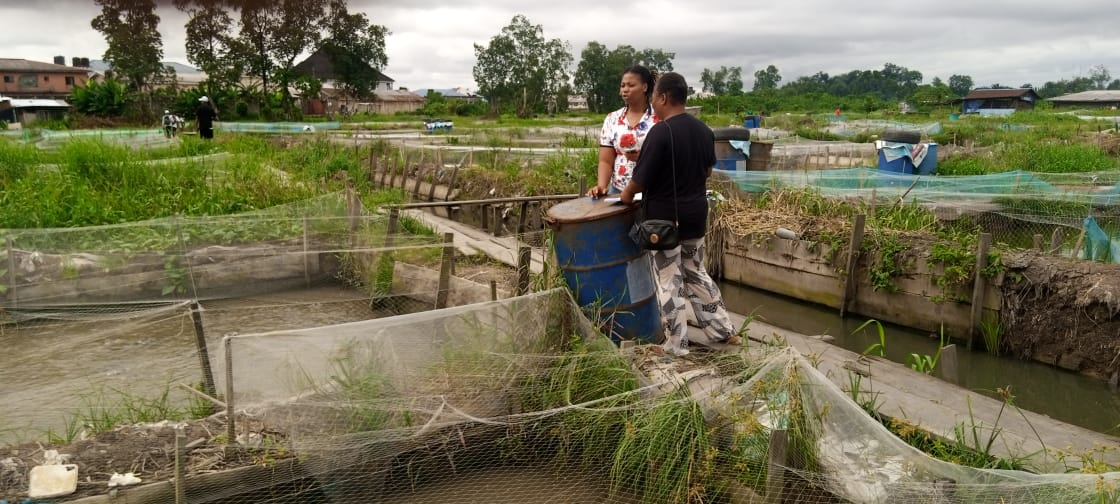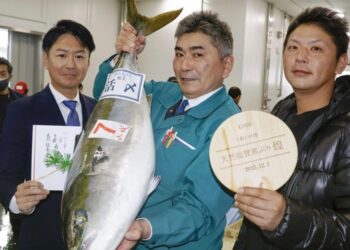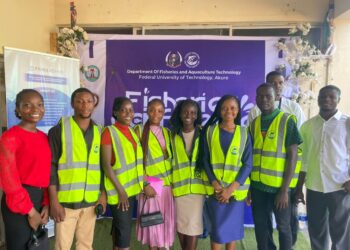Martha’s Queen Dako Journey: From Doctor’s Dream to Aquaculture Champion – Achieving gender equality and women empowerment for enhancing 800 million people’s food security and decent livelihood in developing countries has been recognised as global priority. Indeed, gender equality and the empowerment of women and girls has been included in the 2030 UN Agenda for Sustainable Development as SDG 5. In relation to this, SDG 14 (life underwater) has a crucial role for accomplishing this goal, especially considering the possibilities that aquaculture could provide for women’s employment and empowerment worldwide. Additionally, the intrinsic relationship between SDGs opens opportunitities to develop positive cascade effects on other global objectives – for instance, SDG 1 No Poverty – while attempting to achieve some.
Martha Queen Dako story perfectly exemplifies this: she abandoned her medical career to invest her time in sustainable aquaculture projects, ensuring food security and gender equality for her community.
Martha abandoned her doctoral career and now she knows her heart belongs to a muddy pond, in which she stands knee-deep surrounded by the eager faces of aspiring fish farmers. That is the place where Martha’s dreams are not only feed, but harvested every day, and in which the revolution that aquaculture brings to communities finally realises.
Below are some of her declarations
Can you briefly describe your role in aquaculture?
I currently work for Partners for Development (PfD), that is an NGO that deal with communities and organizations to adopt innovative and tested solutions to meet local needs. For instance, the Aquaculture Business Specialist for the Investment in Delta State (IDSA) project aimed at helping small-scale fish farmers in Nigeria. My responsibilities include providing hands-on technical assistance and training to over 600 fish farmers, hatchery operators, and fish feed distributors to adopt enhanced management practices that generate production, sales, and employment increases. I am also involved in projects involving government agriculture extension workers that promote the uptake of advanced technologies. So far, we have increased the adoption of sustainable techniques for 85% of farmers trained and we could finance several fish farming and fish feed distribution businesses by scaling up their operations. My role allows me to transfer vital technical knowledge to rural communities while ameliorating their livelihoods conditions.
What inspired you to pursue a career in it?
Since I was a child, I dreamt of becoming a doctor. However, fate had a different plan for me when I did not score high enough at the admission exam to study medicine. Instead, I reluctantly accepted the opportunity to study Fisheries, which was a field of expertise I knew nothing about. Initially, I was unenthusiastic to divert from my original vision. However, when classes began reluctancy quickly became curiosity and fascination since I uncovered how crucial and intriguing this field is in tackling food insecurity globally. Although aquaculture was not my initial calling, realizing its potential to sustainably nourish communities inspired me to wholly embrace this career change. While fate may have closed one door, discovering my aptitude and passion for equipping vulnerable communities through sustainable aquaculture has opened countless others.
Reasons to be cheerful
The opportunity to tackle food systems challenges while empowering vulnerable groups through aquaculture is my reason for being cheerful. I look forward to contributing to original intervention projects that responsibly nourishes many.
What does a typical workday consist of for you?
I start my day by reviewing our internal online WhatsApp farmer’s platform with the aim of identifying issues and queries that require my expertise. For minor issues regarding feed or water quality, I provide technical input directly online. However, disease outbreaks require prompt on-site farm visits to diagnose through hands-on stock examinations and implementing targeted interventions to stabilize conditions.
Moreover, during the afternoon I usually recollect the interactions into structured weekly monitoring reports submitted to my coordinating NGO every Monday. This dual approach enables me to sustainably enhance smallholder capacities through individualized extension services, while also communicating progress and areas needing improvement. My typical week job is to assist farmers, conduct site assessments, prescribe improvements, and literature learn.
Do you have any particular concerns about women in aquaculture?
There is lower female participation compared to male participation across production, even considering youth employment. Specifically, in my Investment in Delta State Aquaculture (IDSA) project implementation, I observed:
1) Females are often relegated to processing and sales stages of supply chain while men dominate production activities. This limits women’s decision-making and control across the value chain.
2) Male youth participation was higher than female, and only the 23% of total farmers engaged were youth. Indeed, enhancing access and opportunities for young women to enter this sector is crucial.
Tackling stereotypes by demonstrating female capacities in roles traditionally perceived as male domains can catalyse a shift toward equitable participation.
What advice would you give to women looking to start a career in the sector?
- To develop technical skills: Pursuing educational and vocational opportunities in fisheries sciences and gaining hands-on experience is important.
- Identify mentor networks: Connect with women aquaculture pioneers who can provide guidance. Indeed, learning from others’ experiences will be invaluable.
- Voice as you rise: As you progress, advocate for policies, resources, and social reforms enabling more inclusive participation for women.
What work-related achievement are you most proud of?
The work accomplishment I am most proud of involves the hands-on training I have conducted for over 600 aquaculture-related actors (smallholder fish farmers, hatchery operators, and feed distributors) on aquaculture best practices that enhanced their productivity.
I take pride in trainees retaining key learnings – acknowledging that 85% of farmers apply at least one of the techniques I taught to raise production levels in their operations makes me happy and proud.
Martha’s Queen Dako Journey: From Doctor’s Dream to Aquaculture Champion









